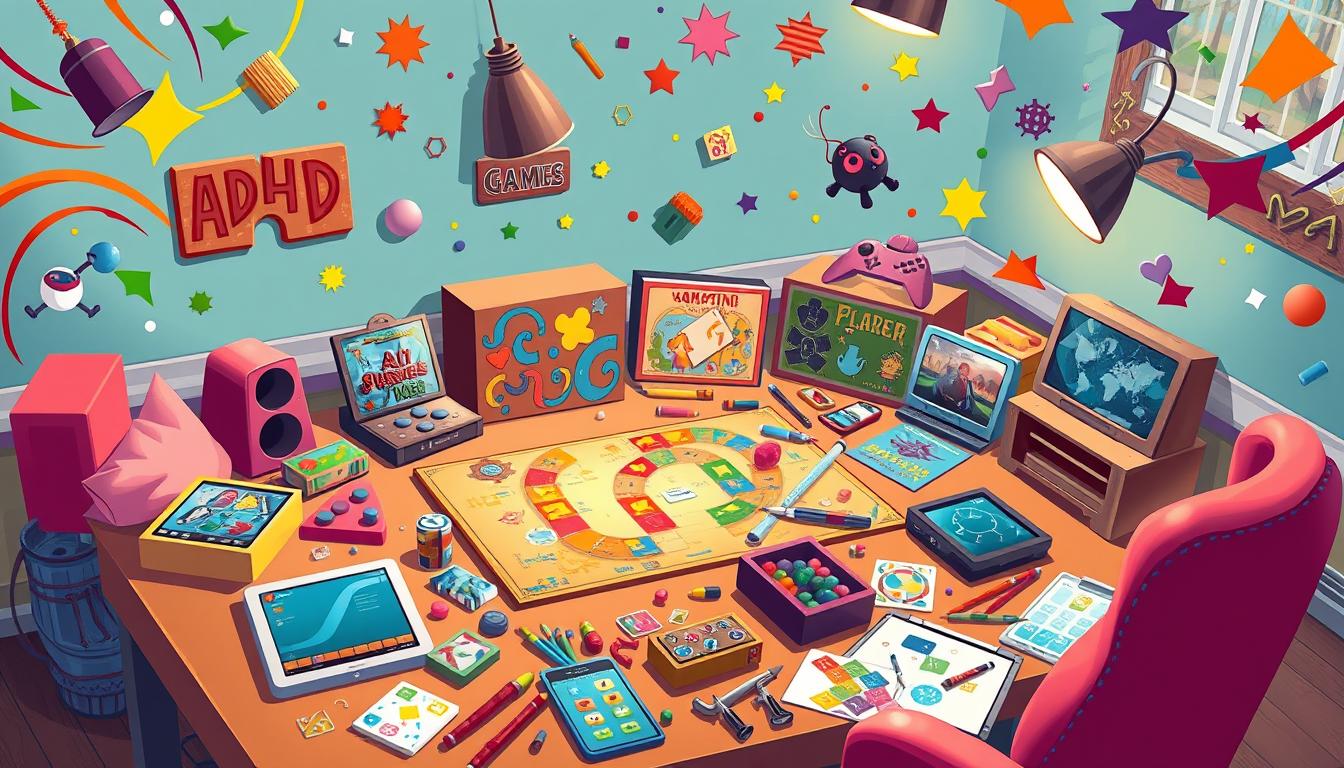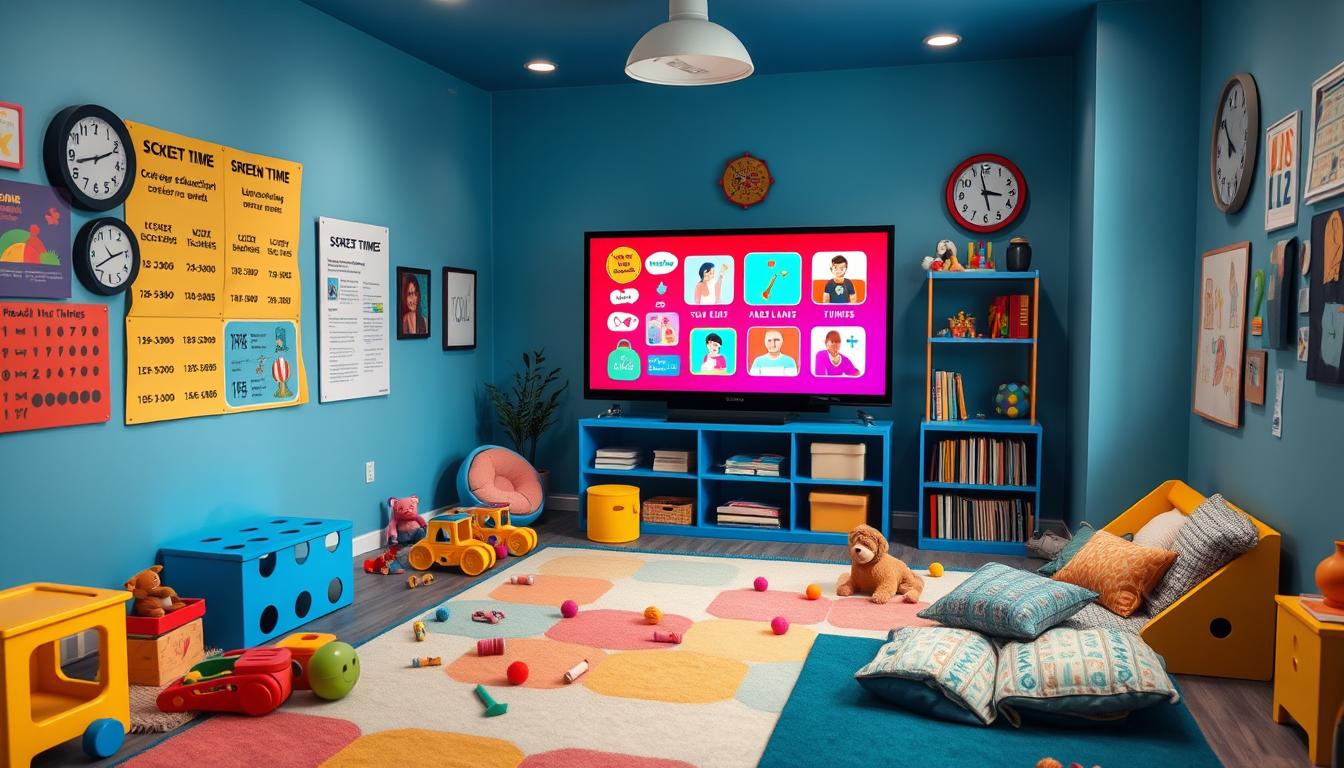Ever found yourself lost in a task for hours? If you have ADHD, you might know this intense focus as hyperfocus. It’s a unique part of ADHD that can be both good and bad. Learning to manage hyperfocus is crucial for using it well.
Imagine being so caught up in a game you forget to eat or sleep. That’s what hyperfixation in ADHD is like. It’s a powerful tool for diving deep into interests, but it can also make daily tasks hard. Let’s find out how to turn this into a success tool.
In this article, we’ll explore ADHD hyperfixation games and how to use intense focus for good. You’ll learn to spot hyperfocus, use its benefits, and deal with its downsides. Whether you’re into gaming, studying, or working, these tips will help you use your ADHD to your advantage.
Key Takeaways
- Hyperfocus is a common trait in ADHD, allowing intense concentration on enjoyable activities
- ADHD hyperfixation can lead to increased productivity and skill development when managed effectively
- Setting timers and creating schedules can help control hyperfocus episodes
- Communicating about hyperfocus with loved ones is crucial for maintaining healthy relationships
- Harnessing hyperfocus for work or study can lead to improved performance and success
Understanding ADHD and Hyperfixation
Attention deficit disorder (ADD) is a complex condition that affects millions. It’s important to understand its core aspects and how they relate to hyperfixation. Let’s explore ADHD, define hyperfixation, and look at their relationship.
What is ADHD?
ADHD is a neurodevelopmental disorder. It causes inattention, hyperactivity, and impulsivity. People with ADHD find it hard to focus on tasks they don’t find interesting.
This can greatly affect daily life, work, and relationships.
Defining Hyperfixation
Hyperfixation is an intense focus on a specific activity or interest for a long time. It’s like your brain is on overdrive, fully absorbed in a task. For those with ADHD, hyperfixation can be both a blessing and a curse.
It can boost productivity but also lead to neglecting other responsibilities.
The Relationship Between ADHD and Hyperfocus
ADHD and hyperfocus are closely linked. Many with ADHD experience intense concentration, often due to digital fixations like video games or social media. This state of hyperfocus can last for hours, making time seem to fly by.
| Aspect | ADHD | Hyperfixation |
|---|---|---|
| Attention | Difficulty maintaining | Intense focus |
| Duration | Ongoing condition | Temporary state |
| Impact | Affects daily functioning | Can be productive or disruptive |
Understanding the connection between ADHD and hyperfixation is crucial for managing symptoms. By recognizing these patterns, you can focus on productive activities while keeping a balanced lifestyle.
The Science Behind Hyperfixation in ADHD
The neurodivergent brain loves stimulating entertainment, often leading to hyperfixation, a common trait in ADHD. Research shows its roots in brain chemistry and function.
Studies reveal low dopamine levels in the frontal lobes cause hyperfixation. This lack affects attention, making people seek tasks that give instant rewards. For some, this means compulsive gaming ADHD, where video games offer the perfect challenge and reward.

- Google Scholar search found 6 studies with hyperfocus in the title
- PubMed revealed 19 results, with 7 empirical studies on cognitive states
- Ozel-Kizil et al. (2013) defined hyperfocusing as intense concentration on non-routine activities
Parents often find it confusing when their ADHD kids focus intensely on video games, ignoring everything else. This deep focus can be both a blessing and a curse. It can lead to great productivity in some areas but neglect others.
| Aspect | Impact on ADHD |
|---|---|
| Dopamine Levels | Low, affecting attention regulation |
| Focus Intensity | High on engaging tasks |
| Environmental Awareness | Diminished during hyperfixation |
| Task Preference | Non-routine, stimulating activities |
Understanding hyperfixation’s science can help find ways to use it well. By knowing what triggers it, you can direct this intense focus towards productive activities.
Recognizing Hyperfixation Patterns
Hyperfixation is common in people with ADHD. It’s important to know how it shows up in your life. We’ll look at patterns and effects of hyperfixation, especially with special interest intense games and hyper-focused video games.
Common Triggers for Hyperfixation
Hyperfixation often comes from activities that really grab your interest or give quick rewards. Video games, especially hyper-focused ones, are big triggers. They grab your attention, making it hard to look away.

Identifying Personal Hyperfocus Tendencies
To spot your hyperfocus patterns, watch for when time slips away. Do you get lost in special interest intense games for hours? See how often this happens and what activities cause it.
The Impact of Hyperfixation on Daily Life
Hyperfixation can really mess with your daily life. It might make you ignore important tasks, mess up your sleep, or hurt your relationships. For instance, too much time on hyper-focused video games could make you forget to eat or miss appointments.
| Aspect of Life | Potential Impact of Hyperfixation |
|---|---|
| Time Management | Loss of track of time, missed deadlines |
| Relationships | Reduced social interaction, neglect of family time |
| Self-Care | Skipped meals, irregular sleep patterns |
| Work/Study | Procrastination on important tasks, hyperfocus on less critical activities |
Knowing these patterns is crucial for managing hyperfixation. By spotting your triggers and habits, you can find ways to balance your interests with everyday duties.
ADHD Hyperfixation Games: A Double-Edged Sword

Attention deficit hyperactivity disorder often leads to hyperfixation, a common experience for those with ADHD. When it comes to gaming, this intense focus can be both a blessing and a curse. You might find yourself completely absorbed in a game, losing track of time and neglecting other responsibilities.
Hyperfocus gaming can boost your problem-solving skills and creativity. You might excel at complex game strategies or level design. But this intense focus can also lead to time blindness and social isolation. It’s crucial to find a balance between your gaming passion and other life aspects.
Consider these statistics:
- Individuals with ADHD are more likely to experience hyperfixation compared to those without the condition.
- Hyperfixation can offer increased productivity and deep knowledge acquisition in specific areas.
- The duration and intensity of hyperfixations can vary, lasting from days to months or longer.
To manage hyperfixation in gaming, try setting time limits or using the Pomodoro method. Getting an accountability partner can also help you maintain a healthy balance. Remember, the goal is to enjoy your gaming experiences without letting them overshadow other important aspects of your life.
“Hyperfixation can be a superpower when channeled correctly, but it requires conscious effort to harness its benefits while mitigating its drawbacks.”
By understanding the dual nature of hyperfixation in gaming, you can develop strategies to make the most of your intense focus while maintaining a well-rounded lifestyle. It’s all about finding that sweet spot where your passion for gaming enhances rather than hinders your overall well-being.
The Benefits of Channeling Hyperfixation
Hyperfixation can be a game-changer for those with ADHD. It turns intense focus into a superpower, boosting productivity and sparking creativity. Let’s see how you can make the most of your hyperfixation.
Increased Productivity and Creativity
ADHD hyperfixation games can really stimulate your brain. They help you tap into a deep well of creativity. Your mind becomes super-focused, making it easier to come up with new ideas and solve tough problems.

Skill Development Through Intense Focus
Hyperfocusing on a task lets you learn at an incredible pace. This deep focus helps you develop skills fast. Whether it’s coding, art, or music, your hyperfixation can help you learn new things quickly.
Potential Career Advantages
Your ability to hyperfocus can set you apart in your career. Many successful people say their achievements come from their deep focus. By using your hyperfixation for work, you can excel and stand out.
| Benefit | Impact |
|---|---|
| Increased Productivity | Complete tasks faster and more efficiently |
| Enhanced Creativity | Generate unique ideas and solutions |
| Rapid Skill Acquisition | Master new abilities quickly |
| Career Advancement | Excel in your chosen field |
Understanding and using your hyperfixation can change your life. It can turn a challenge into a powerful tool for growth. Embrace your intense focus and watch it help you succeed in many areas of your life.
Potential Risks of Unchecked Hyperfixation

Hyperfixation in ADHD can be both good and bad. It can make you very productive. But, if not controlled, it can cause big problems. About 60% of people with ADHD have intense hyperfixation episodes often.
This can make you ignore important tasks, hurt your relationships, and mess up your daily plans. For those with special needs, these issues can be even worse. You might forget to eat, sleep, or take care of yourself because you’re so focused on one thing.
This can lead to health problems over time. Managing your time becomes very hard. You might miss deadlines, appointments, or important events because you’re too caught up in your hyperfixation.
- Neglect of self-care and basic needs
- Strained relationships due to lack of attention
- Poor time management and missed obligations
- Potential for compulsive behaviors, especially with video games
It’s important to know these risks and find ways to handle hyperfixation. This way, you can use its benefits without letting it harm your life and health.
Strategies for Managing Hyperfixation
Managing hyperfixation is key for those with attention deficit disorder. By using the right strategies, you can enjoy hyperfocus gaming without losing balance in your life.
Setting Time Limits and Using Alarms
Setting clear boundaries is a great way to control hyperfixation. Use timers or alarms to remind you when it’s time to stop. This stops hours from slipping away during intense focus.
Creating a Balanced Schedule
Make a plan for your day that includes different tasks. Set aside time for activities that draw you in, but also make time for other important tasks. This keeps you productive in all areas of your life.
Implementing Regular Breaks
Breaks are crucial when you’re deeply focused. Try the Pomodoro Technique or similar methods. It lets you focus intensely, then rest briefly.

| Strategy | Implementation | Benefit |
|---|---|---|
| Time Limits | Set alarms for activity duration | Prevents excessive time spent |
| Balanced Schedule | Plan diverse daily tasks | Ensures all responsibilities are met |
| Regular Breaks | Use techniques like Pomodoro | Maintains focus without burnout |
Using these strategies, you can enjoy the benefits of hyperfocus gaming. Just remember, the goal is to use your intense focus wisely, not to get rid of it.
Productive Activities to Channel Hyperfixation
Turning ADHD hyperfixation into something positive can change your life. Instead of fighting it, use this intense focus to your advantage. Let’s look at some productive ways to channel your hyperfixation.

Creative projects are a great way to use hyperfixation. You might get lost in painting, writing, or composing music for hours. These activities let you express yourself and can lead to amazing results.
Learning new skills is another good way to use hyperfixation. You can dive deep into a subject that interests you, like coding, cooking, or a new language. This focus can help you make quick progress in your chosen area.
For students, hyperfixation can be a powerful tool for success. You can use it to tackle complex subjects or projects that need deep understanding. This focused attention can lead to better grades and a deeper understanding of the material.
- Start a blog about your interests
- Take up a challenging puzzle or strategy game
- Begin a DIY home improvement project
- Learn to play a musical instrument
Remember, the key is to choose activities that align with your goals or responsibilities. This way, you’re making the most of your hyperfixation while still staying on track with your life objectives.
While dopamine boosting digital fixations like video games can be tempting, try to limit these in favor of more productive activities. By channeling your hyperfixation into constructive pursuits, you’re not just passing time – you’re building skills and creating value.
Harnessing Hyperfocus for Work and Study
Hyperfocus can be a powerful tool for neurodivergent individuals. It can boost productivity and problem-solving skills. Let’s explore how to make the most of this unique trait in work and study environments.
Techniques for Maintaining Focus
To harness hyperfocus, try these methods:
- Use the Pomodoro technique: Work in 25-minute bursts with short breaks
- Create a to-do list: Prioritize tasks to guide your focus
- Set clear goals: Define what you want to achieve in each session
These strategies can help you stay on track and make the most of your hyperfocus periods.
Creating a Productive Environment
Your surroundings play a crucial role in fostering hyperfocus. Consider these tips:
- Find a quiet space: Minimize external distractions
- Use noise-cancelling headphones: Block out ambient noise
- Organize your workspace: Keep only essential items within reach
A well-designed environment can significantly enhance your ability to enter and maintain a state of hyperfocus.
Utilizing Hyperfocus for Complex Problem-Solving
Hyperfocus can be a superpower when tackling challenging tasks. Here’s how to leverage it:
- Break complex problems into smaller, manageable parts
- Use mind mapping to visualize connections between ideas
- Allow yourself uninterrupted time to dive deep into the problem
By applying these techniques, you can transform hyperfocus into a powerful tool for innovation and efficiency.

Remember, while hyper-focused video games can provide neurodivergent brain stimulating entertainment, applying hyperfocus to work and study can lead to remarkable achievements. By understanding and harnessing this unique trait, you can unlock your full potential in both professional and academic settings.
| Hyperfocus Benefits | Potential Challenges |
|---|---|
| Enhanced productivity | Time management issues |
| Improved problem-solving | Neglecting self-care |
| Increased creativity | Difficulty transitioning tasks |
| Deep learning | Social disconnection |
ADHD-Friendly Tools and Apps for Managing Hyperfixation
Living with attention deficit hyperactivity disorder (ADHD) can be tough. But, there are many tools to help manage symptoms. Let’s look at some ADHD-friendly apps that can help with hyperfixation and boost productivity.

Tools like ClickUp are great for adults with ADHD. It has a 4.7/5 rating on G2 and Capterra. ClickUp helps organize tasks and keep focus.
Due is a reminder app priced at $7.99 on the App Store. It helps you stay on schedule all day.
Inflow is rated 4.2/5 on Google Play and 4.3/5 on the App Store. It’s made for managing ADHD symptoms. It offers strategies for brain stimulation and focusing.
Routinery is another helpful app. It has high ratings of 4.6/5 on Google Play and 4.7/5 on the App Store. It helps create and keep up with daily routines, which is key for managing hyperfixation.
| App Name | App Store Rating | Google Play Rating | Key Feature |
|---|---|---|---|
| Focus@Will | 4.5 | 3.5 | Brain stimulation music |
| Epic Win | 3.1 | 4.2 | Gamified task management |
| RescueTime | 5.0 | 3.6 | Automatic time tracking |
| Mint | 4.7 | 4.5 | Financial management |
Finding the right tools might take some trial and error. With about 4.4% of American adults dealing with ADHD, these apps can be life-changers. They help manage symptoms and improve daily life.
The Role of Support Systems in Managing Hyperfixation

Living with ADHD and hyperfixation can be tough. But, you’re not alone. Support systems are key in helping those with special needs through the ups and downs of neurodivergence.
Family and friends are often the first to help. They can remind you when you’ve been too focused on one thing. A simple tap or a kind word can snap you out of hyperfixation and back to reality.
Support groups for ADHD offer a lot of knowledge and understanding. Sharing stories with others who face similar challenges can be very empowering. You might learn new ways to manage hyperfixation.
Professional help is also very valuable. Therapists and ADHD coaches can help you find personal strategies for managing hyperfixation. They can help you figure out what triggers it and how to stay balanced in your daily life.
“Understanding and support from those around you can make a world of difference in managing ADHD hyperfixation.”
It’s important to educate your support system about hyperfixation. When they understand what you’re going through, they can offer better help. This understanding can create a more supportive environment for you to thrive.
Remember, asking for help is a sign of strength, not weakness. Building a strong support network is a big step towards managing your hyperfixation and embracing your unique neurodivergent traits.
Developing Self-Awareness and Metacognition
Understanding your own mind is key to managing ADHD and hyperfocus. Let’s explore how you can boost your self-awareness and take control of your cognitive processes.
Recognizing the Onset of Hyperfixation
Spotting hyperfixation early is crucial. Pay attention to signs like losing track of time, forgetting to eat, or ignoring other tasks. These clues can help you catch hyperfocus before it takes over.

Practicing Mindfulness Techniques
Mindfulness can sharpen your awareness. Try setting reminders to check in with yourself throughout the day. Ask: “What am I doing right now? Is this what I planned to do?” This simple practice can prevent unintended hyperfocus sessions.
Reflecting on Hyperfixation Episodes
After a hyperfixation episode, take time to reflect. What triggered it? How long did it last? Was it productive or disruptive? Keeping a journal can help you spot patterns and improve your self-regulation skills.
By developing these skills, you’re not just managing ADHD symptoms – you’re turning potential cognitive impairment into a superpower. Remember, hyperfocus can be a valuable tool when channeled correctly. With practice, you’ll learn to harness its power while avoiding its pitfalls.
Balancing Hyperfixation with Self-Care
It’s easy to get lost in ADHD hyperfixation games or special interest intense games. But, it’s important to remember to take care of yourself. Balancing your passions with self-care is key for your well-being.
Use timers and alarms to remind you to take breaks. This helps you step away from your hyperfixation. You can then focus on basic needs like eating, drinking water, and sleeping. Try apps like Trello or Todoist to plan your day, including both your intense interests and self-care activities.

Don’t get too caught up in just one activity. Having diverse interests can boost your creativity and productivity. It’s perfectly fine to have more than one hobby!
| Self-Care Strategy | Benefit |
|---|---|
| Regular sleep schedule | Improved cognitive function |
| Healthy eating habits | Better energy levels |
| Physical activity | Stress reduction |
| Mindfulness practices | Enhanced self-awareness |
If your hyperfixation is affecting your life too much, get professional help. A mental health expert can offer strategies tailored to you. They can help you find a balance between your intense interests and self-care.
When to Seek Professional Help for Hyperfixation
Living with attention deficit disorder can be tough, especially when hyperfixation takes over. While fun neurodivergent entertainment is great, knowing when to get help is key.
If hyperfixation is messing with your daily life, relationships, or happiness, it’s time to talk to a mental health expert. Here are some signs you might need help:
- Persistent trouble managing time
- Ignoring important tasks
- Strained relationships
- Insomnia or sleep problems
- Feeling isolated
- Too dependent on what you’re fixated on

ADHD specialists can offer strategies to tackle these issues. They might suggest:
- Cognitive-behavioral therapy
- Mindfulness practices
- Medication options
- Learning to manage time better
Seeking help is brave, not weak. It shows you care about your mental health and want a better life.
| Condition | Associated with Hyperfixation |
|---|---|
| ADHD | Yes |
| Anxiety | Yes |
| OCD | Yes |
| Autism | Yes |
| Depression | Yes |
If you’re battling hyperfixation, don’t wait to get help. With the right support, you can manage your symptoms and find a better balance in life.
Conclusion
Exploring ADHD hyperfixation games and hyperfocus gaming is exciting but also challenging. You’ve discovered that hyperfixation is more than just a quirk. It’s a powerful force that can greatly impact your life.
With the right approach, you can turn this intense focus into a superpower. It can boost your productivity and creativity.
Managing ADHD hyperfixation isn’t about getting rid of it. It’s about finding a balance. Set time limits, create a schedule, and use tools made for ADHD brains.
These strategies can help you use hyperfocus to your advantage. They can also prevent its negative effects.
Are you ready to improve your ADHD management skills? Start by figuring out what triggers your hyperfixation. Then, try to use that focus for activities that match your goals.
You might be amazed at what you can accomplish. Working with your brain, not against it, can make a big difference.
The journey doesn’t stop here. Keep exploring and learning. Don’t be afraid to ask for help when you need it. Your unique ADHD brain has incredible potential. It’s time to unlock it and see where it can take you!










